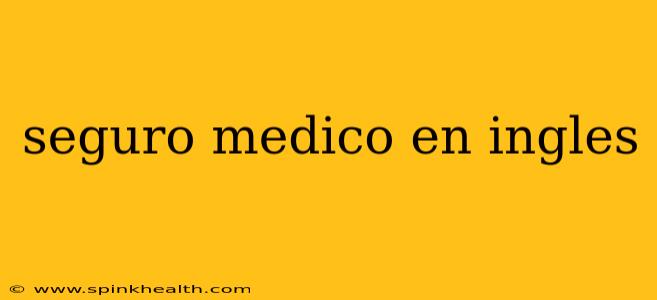Navigating the World of Health Insurance in English: A Comprehensive Guide
Finding the right health insurance can feel like navigating a maze, especially when dealing with unfamiliar terminology. This guide will help you understand the key concepts and terminology surrounding health insurance, specifically focusing on the English language equivalents and explanations. We'll unravel the complexities, ensuring you feel confident in your understanding.
Let's begin our journey. Imagine you're a traveler venturing into a new land – the land of health insurance. The first thing you'll need is a map, and this guide is your trusty compass.
What is Health Insurance in English?
Health insurance, simply put, is a contract between you (the policyholder) and an insurance company. You pay a regular fee (premium) in exchange for the company's promise to cover all or part of your medical expenses. This protection shields you from potentially crippling financial burdens in case of illness or injury.
What are the Different Types of Health Insurance Plans?
There's no one-size-fits-all solution when it comes to health insurance. The type of plan that best suits you depends on your individual needs and budget. Let's explore some common types:
-
HMO (Health Maintenance Organization): Think of an HMO as a closed network. You'll generally need to choose a primary care physician (PCP) within the network, who will then refer you to specialists if needed. HMOs typically have lower premiums but stricter rules about seeing out-of-network providers.
-
PPO (Preferred Provider Organization): PPOs offer more flexibility. You can see in-network or out-of-network providers, but you'll usually pay less if you stick to the network. Premiums are generally higher than HMOs.
-
EPO (Exclusive Provider Organization): Similar to HMOs, EPOs require you to choose providers from their network. However, unlike HMOs, EPOs usually don't require a referral to see a specialist.
-
POS (Point of Service): POS plans combine elements of HMOs and PPOs. You choose a PCP, but you have more flexibility to see out-of-network providers, although at a higher cost.
-
Catastrophic Plans: These plans are designed for younger, healthier individuals. They have very low premiums but high deductibles and out-of-pocket maximums. They're only suitable if you anticipate minimal healthcare needs.
What are Premiums, Deductibles, and Co-pays?
Understanding these key terms is crucial to grasping health insurance:
-
Premium: This is the regular payment you make to maintain your health insurance coverage. It's like a membership fee.
-
Deductible: The amount you pay out-of-pocket before your insurance coverage kicks in. Once you meet your deductible, your insurance will begin to cover a larger portion of your medical expenses.
-
Co-pay: A fixed amount you pay for a doctor's visit or other medical service. This amount is usually much less than the full cost of the service.
-
Coinsurance: The percentage of costs you share with your insurance company after you've met your deductible. For example, 80/20 coinsurance means your insurance company pays 80% and you pay 20%.
-
Out-of-pocket maximum: The most you'll pay out-of-pocket for covered services in a year. Once you reach this limit, your insurance company covers 100% of the remaining costs.
How Do I Choose the Right Health Insurance Plan?
Choosing the right plan involves careful consideration of several factors:
-
Your budget: How much can you comfortably afford to pay in premiums each month?
-
Your health needs: Do you anticipate needing frequent medical care?
-
Your preferred doctors: Do your preferred doctors participate in specific insurance networks?
-
Your prescription drug needs: Does the plan cover your necessary medications?
What are the Penalties for Not Having Health Insurance?
The penalties for not having health insurance vary by country and region. It's crucial to understand the laws and regulations in your area. Consult official government websites or a qualified insurance broker for the most accurate and up-to-date information.
This guide provides a foundational understanding of health insurance in English. Remember, always consult with a qualified insurance professional or refer to official government resources for personalized advice and the most accurate information relevant to your specific situation. Your health and financial well-being are paramount.

